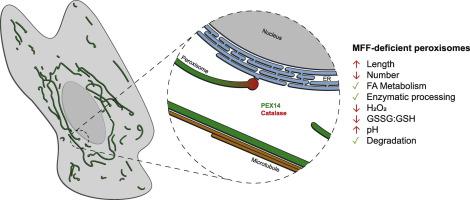Biochimica et Biophysica Acta (BBA) - Molecular Cell Research ( IF 4.6 ) Pub Date : 2020-03-26 , DOI: 10.1016/j.bbamcr.2020.118709 Josiah B Passmore 1 , Ruth E Carmichael 1 , Tina A Schrader 1 , Luis F Godinho 1 , Sacha Ferdinandusse 2 , Celien Lismont 3 , Yunhong Wang 4 , Christian Hacker 1 , Markus Islinger 4 , Marc Fransen 3 , David M Richards 5 , Peter Freisinger 6 , Michael Schrader 1

|
Peroxisomes are highly dynamic subcellular compartments with important functions in lipid and ROS metabolism. Impaired peroxisomal function can lead to severe metabolic disorders with developmental defects and neurological abnormalities. Recently, a new group of disorders has been identified, characterised by defects in the membrane dynamics and division of peroxisomes rather than by loss of metabolic functions. However, the contribution of impaired peroxisome plasticity to the pathophysiology of those disorders is not well understood. Mitochondrial fission factor (MFF) is a key component of both the peroxisomal and mitochondrial division machinery. Patients with MFF deficiency present with developmental and neurological abnormalities. Peroxisomes (and mitochondria) in patient fibroblasts are highly elongated as a result of impaired organelle division. The majority of studies into MFF-deficiency have focused on mitochondrial dysfunction, but the contribution of peroxisomal alterations to the pathophysiology is largely unknown. Here, we show that MFF deficiency does not cause alterations to overall peroxisomal biochemical function. However, loss of MFF results in reduced import-competency of the peroxisomal compartment and leads to the accumulation of pre-peroxisomal membrane structures. We show that peroxisomes in MFF-deficient cells display alterations in peroxisomal redox state and intra-peroxisomal pH. Removal of elongated peroxisomes through induction of autophagic processes is not impaired. A mathematical model describing key processes involved in peroxisome dynamics sheds further light into the physical processes disturbed in MFF-deficient cells. The consequences of our findings for the pathophysiology of MFF-deficiency and related disorders with impaired peroxisome plasticity are discussed.
中文翻译:

线粒体分裂因子(MFF)是过氧化物酶体成熟的关键调节剂。
过氧化物酶体是高度动态的亚细胞区室,在脂质和ROS代谢中具有重要功能。过氧化物酶体功能受损可导致严重的代谢紊乱,并伴有发育缺陷和神经系统异常。最近,已经鉴定出一组新的疾病,其特征在于膜动力学和过氧化物酶体的分裂而不是代谢功能的丧失。但是,过氧化物酶体可塑性受损对那些疾病的病理生理学的影响尚不清楚。线粒体分裂因子(MFF)是过氧化物酶体和线粒体分裂机制的关键组成部分。MFF缺乏症患者出现发育和神经系统异常。由于细胞器分裂受损,患者成纤维细胞中的过氧化物酶体(和线粒体)高度延长。关于MFF缺乏症的大多数研究都集中于线粒体功能障碍,但过氧化物酶体改变对病理生理的影响在很大程度上尚不清楚。在这里,我们表明MFF缺乏不会引起总过氧化物酶体生化功能的改变。然而,MFF的损失导致过氧化物酶体区室的进口能力降低,并导致过氧化物酶体前膜结构的积累。我们显示,MFF缺陷细胞中的过氧化物酶体在过氧化物酶体的氧化还原状态和过氧化物酶体内部的pH中显示出变化。通过诱导自噬过程去除延长的过氧化物酶体不会受到损害。描述过氧化物酶体动力学涉及的关键过程的数学模型进一步阐明了MFF缺陷细胞中受干扰的物理过程。讨论了我们的研究结果对MFF缺乏症和过氧化物酶体可塑性受损的相关疾病的病理生理学的影响。











































 京公网安备 11010802027423号
京公网安备 11010802027423号